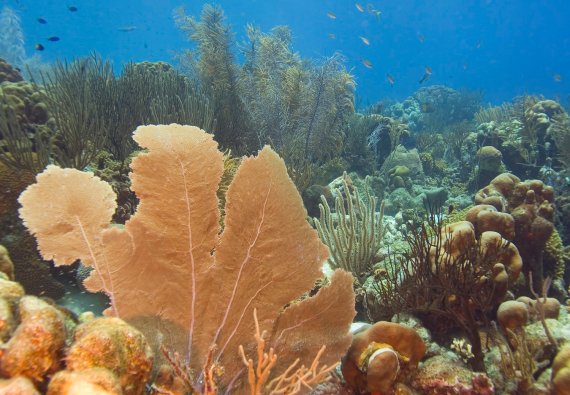Oxybenzone functions as a UV filter in sunscreens, blocking UV light and thus protecting the skin. But the substance is also strongly suspected of harming coral. So these creams are banned on the beaches of tropical islands such as Aruba and Bonaire. Wageningen Marine Research put the theory to the test and exposed coral to oxybenzone over a long period.
A long period means a couple of weeks. A long time for toxicity research, says ecologist Diana Slijkerman. ‘When substances are tested, it is often a matter of a day or a few days. This test took a total of six weeks.’ That has a lot to do with coral’s vulnerability. It is not easy to do laboratory tests with coral.
Slijkerman and her colleagues studied two of the most common coral species, Acropora tenuis and Stylophora pistilata. The corals came from Burgers’ Zoo in Arnhem. Some of them were exposed to oxybenzone, some were subjected to artificial climate change by heating the water, and some underwent both treatments at the same time.
The effects were observable even at lower concentrations.
Diana Slijkerman
Both species of coral reacted to oxybenzone. But the effects were subtle and varied per species. The temperature effect (climate change) proved much stronger than the effect of oxybenzone. All the Acropora gave up the ghost at a higher temperature (320C) and died a few days earlier when subjected to oxybenzone. All the Stylophora survived both attacks, though they were left with some battle scars.
Use alternative creames
The effects were observable even at lower concentrations. There is a big drop, for instance, in the photosynthesis of zooxanthellea, single-cell symbionts that provide coral with oxygen. This suppresses the coral’s metabolism, which seems to have an impact on its growth, although this has not been proven statistically. A change was also seen in the composition of the bacterial population that supports a range of processes.
The experiment showed that oxybenzone does not kill coral outright. ‘But it constitutes yet another negative effect on the health of coral,’ says Slijkerman. She therefore recommends that tourists use creams that do not contain oxybenzone, even though the effects on coral of many of the alternative substances in sunscreens are unknown.

 Photo: Diana Slijkerman
Photo: Diana Slijkerman